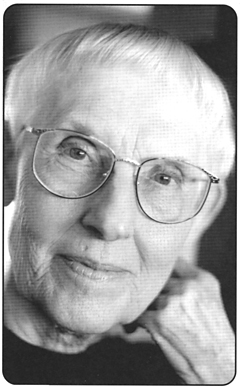 What was most remarkable about Charlotte Joko Beck was her spaciousness. Being with her was sharing this spaciousness, which is ours—though we often miss it. Joko translated this into practice to allow others to taste it and see what attachments and self-centeredness were hindering and obscuring this. Though some got caught up in particular methods of working with clinging and emotional reactions, Joko encouraged observing, noticing reactions and bodily experiencing to “pop” into the present.
What was most remarkable about Charlotte Joko Beck was her spaciousness. Being with her was sharing this spaciousness, which is ours—though we often miss it. Joko translated this into practice to allow others to taste it and see what attachments and self-centeredness were hindering and obscuring this. Though some got caught up in particular methods of working with clinging and emotional reactions, Joko encouraged observing, noticing reactions and bodily experiencing to “pop” into the present.
Joko became a teacher because others made her one. People came to her to talk about practice long before she was designated formally as a Dharma heir. The clarity of her own life and practice, her ability to help them clarify their life, was what attracted others to her. Though her official work was as a secretary to Maezumi Roshi, her office was often filled with those seeking practice help. People came to her apartment door during “free time” to talk with her. “There are always shoes at Joko’s door,” was said at ZCLA.
When people went to Maezumi Roshi with personal difficulties, often he would tell them, “Go talk to Joko.”
Early in her teaching life she surprised people in a Dharma talk at ZCLA by saying, “I am fully present about 15-20% of the time.” This frankness thrilled many, as it went against the idealized (and nearly unattainable) image that Zen teachers were “always fully present.”
Joko said to me, “Roshi doesn’t know what to make of my Dharma talks. He isn’t sure if he likes them. But since so many people tell him how much they like them, he says to me, ’Joko, give more talks.’ “
Despite grandmotherly kindness and the ordinariness of her life and practice approach, Joko was rigorous in her practice and teaching. She set clear expectations for her students of daily sitting, coming to the Zendo and coming see her regularly. She said to many students who lived at a distance, “call me every week,” if they wanted to be her student. She was one of the first Zen teachers to encourage students to use phone calls to her as a regular practice tool.
Family relations, jobs, emotions and upsets could not be separated from “Zen practice” and she did not allow students to avoid those. Once, (before I had any children) she said to me, “When biological ties are touched, especially mother-child, it is hard not to get caught.” I know this was true in her life and something she worked with regarding her own adult children.
Joko used many practice devices to shake up attachments. “Don’t be attached to any form,” she said to me in regard to the Bodhisattva precept “not begrudging the Dharma Treasure” (Being Generous/Not Being Greedy). During sesshin/intensives, the biggest meal is lunch, with rice, vegetables, tofu and a drink typical. One sesshin lunch at ZCSD when the meal servers brought out the serving bowls the first course was slices of bread; the second pitchers of water. And that was it. Joko reminded those who complained that they had the option of “seconds” of bread.
Though some people think that Joko did not value intense practice, this is not true. Her criticism of some forms of concentrated practice was that they were treated in a narrow and limited way. She said, it is “important not to shut anything out when doing concentrated practice,” so that it is “continuous practice.” And that was exactly her emphasis on ordinary life practice.
Joko did not use any titles for herself. And when students made public comments at the end of sesshin she often reminded them that she did not want to hear how wonderful she was or how much they loved her, but wanted them to speak of their live practice.
Joko ordained several people in private because she saw it as supporting their life practice and ability to serve. She did not want it to become a source of pride, or create a sense of privilege. Though Joko made a number of Dharma heirs, in her last decade she wondered if it would have been better not to make any. Being a Dharma heir did not mean that one’s practice with her was over. She often told her Dharma heirs who lived at a distance, “Call me,” to encourage them to see this – some did and some did not. She was concerned about the proliferation of titles and such among Zen people, and was critical of Dharma heirs who “think they know something” (or “are something”).
When someone sewed two rakusu for me, Joko offered to write on them. One the first she wrote “Namu Dai Bosa” (Being One with Great Bodhisattva). On the second she happily wrote “Nothing special”.
Though she has died, we can share her spaciousness in her teachings and in our ongoing practice.
Thank you for subscribing to Tricycle! As a nonprofit, we depend on readers like you to keep Buddhist teachings and practices widely available.